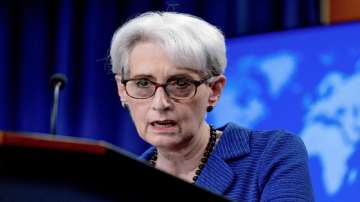A U.S.-sponsored show of alliance with Japan and South Korea stumbled Wednesday when American diplomats couldn’t convince their Asian allies to share a news conference stage.
Deputy Secretary of State Wendy Sherman was due to hold the press conference at the State Department with her counterparts, Choi Jong Kun of South Korea and Mori Takeo of Japan.
Instead, Sherman sat at a table alone, taking question from reporters from those countries. In explanation, she cited “some bilateral differences” between those two Asian allies of the U.S. “that are continuing to be resolved, unrelated to today’s meeting.”
Neighbors Japan and South Korea have no shortage of disputes. However, those disagreements have rarely, if ever, forced the cancellation of a three-way display of unity on North Korea with the United States, which has treaty commitments to defend both countries and a large troop presence in each.
The areas of conflict include Japan’s wartime occupation of Korea and other historical matters, Japan’s handling of radioactive material from the Fukushima nuclear disaster, trade conflicts and other matters.
Japan places a premium on resolving the matter of Japanese citizens abducted by North Korea, while South Korea has often been more willing to show lenience toward its immediate neighbor.
South Korea, meanwhile, harbors great residual animosity toward Japan over its wartime behavior and occupation of Korea, including the issue of so-called “comfort women”- Korean women forced into sexual servitude by Japan’s imperial army.
More recently, the two U.S. allies have had high-profile disputes over commercial practices and intelligence sharing.
The United States has been working to build multiparty alliances in the Indo-Pacific as a deterrence to China’s own territorial claims there. The canceled three-party press conference appeared an unusual- and unusually public- warning of the limits of any such U.S., Japan and South Korea alliance.
Sherman said the three-country meeting before the news conference had lasted three hours. It had been “friendly, constructive, substantive,” she said.
The progress before the news conference no-show “demonstrates exactly why the trilateral format with the United States, Japan and the Republic of Korea is so important and powerful,” Sherman said.
In a statement, the U.S. said the three “reaffirmed that close cooperation” among them “is critical to address a broad range of global issues, including combatting the climate crisis; investing in clean energy and resilient infrastructure; upholding our shared democratic values and commitment to human rights; and working together to end the COVID-19 pandemic.”
Latest World News
